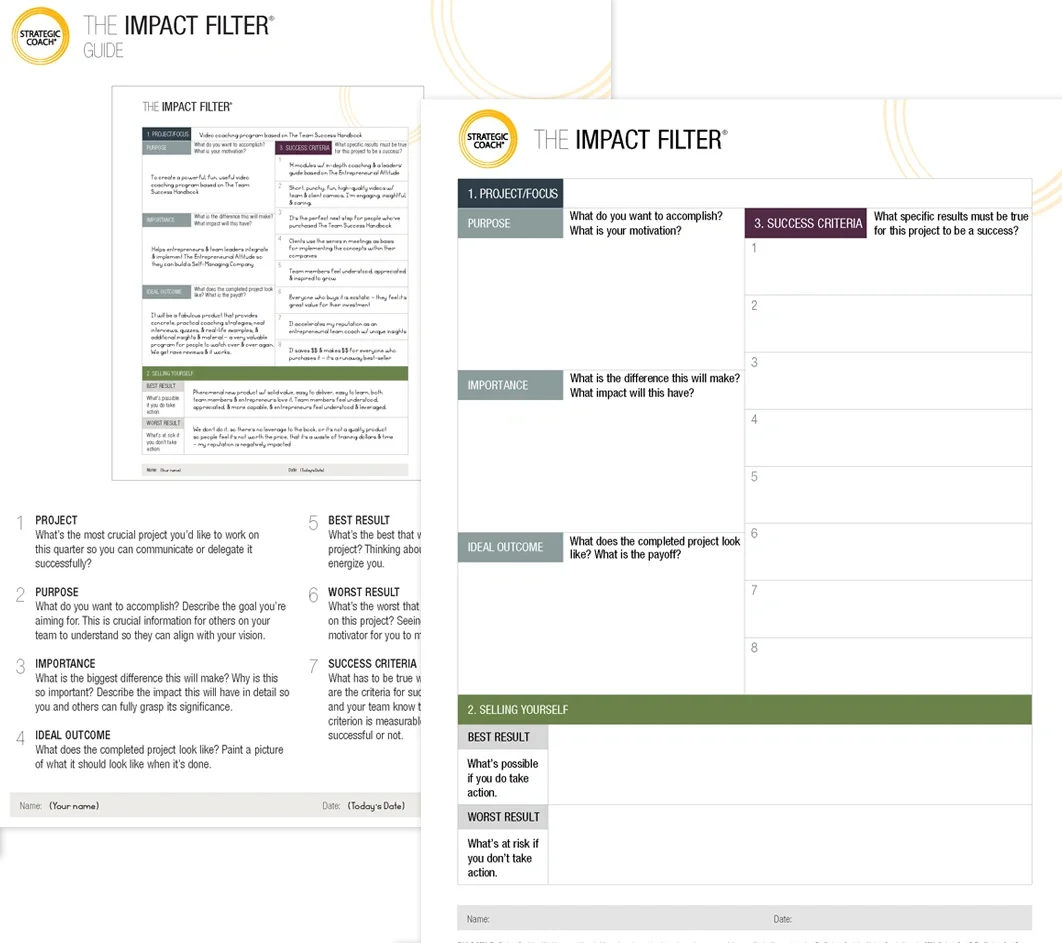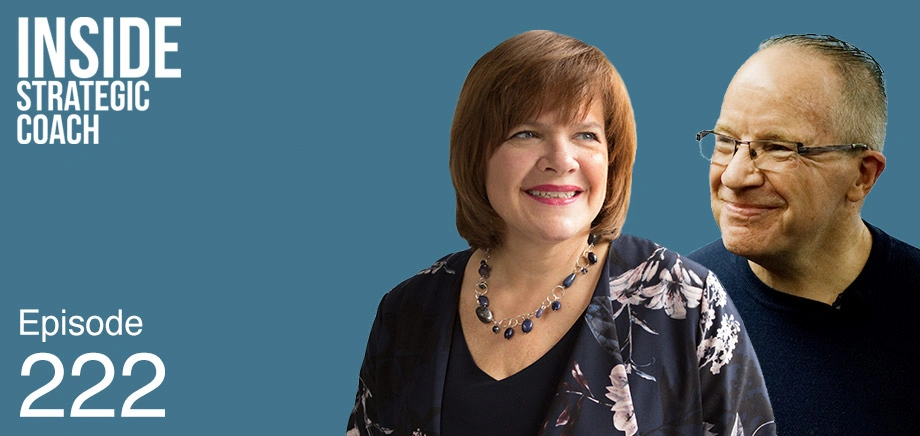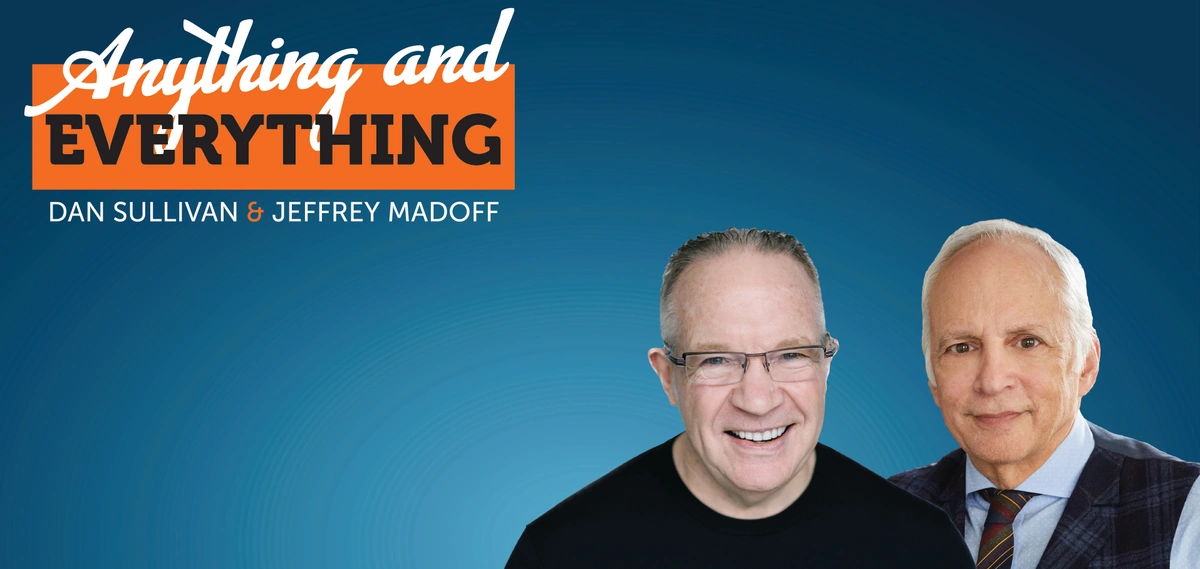What Ambition Looks Like At 80
February 04, 2025
Hosted By
 Dan Sullivan
Dan Sullivan
 Shannon Waller
Shannon Waller
Do you believe ambition fades with age, or can it actually grow stronger? In this episode, Shannon and Dan discuss how ambition evolves over time, share Dan's desire to be even more ambitious at 90, and reveal how transforming ambition into action can lead to growth and fulfillment at every age.
Here’s some of what you’ll learn in this episode:
- How Dan’s strongest ambition relates to ambition itself.
- What you can gain by sticking to what you’re great at and love doing.
- How Dan came up with the goal of living to the age of 156.
- Ways you can lean into expanding your ambition.
- Why it’s easier to move forward than to maintain your position.
- Why some successful entrepreneurs get discouraged when they think about their ambition.
- The dire consequences of giving up your ambition.
Show Notes:
People begin to feel old when they stop making commitments—and stop prioritizing courage.
When entrepreneurs focus exclusively on doing what they’re great at and love doing, their impact multiplies. When combined with technology, the results are exponential.
Since your skills and capabilities will be much greater 10 years from now, your goals can be much bigger in 10 years too.
When you’re ambitious, all sorts of unexpected opportunities and experiences become available to you.
When you view ambition as an action, it becomes something you can invest your talent, skills, and time into.
Ambition is a skill made up of a number of subskills.
When your brain normalizes the idea that you’re going to live far longer than normal expectations, it changes your understanding of the present.
Time only speeds up when you think you’re running out of it.
Being unable to imagine yourself with more ambition in the future robs you of your power in the present.
No one’s interested in being in teamwork with someone who’s stopped growing.
Your real age has to do with what lies ahead of you—and your imagination.
What human beings most look for in other human beings is commitment and courage.
Commitment and courage create capability.
If you’re more committed and more courageous, it’s easy to be more ambitious.
Confidence is the reward for acquiring a new capability.
With a higher level of confidence, you can make greater commitments.
To make any significant improvement or change in your life, you have to be 100% committed to doing it.
You only truly start aging when you give up your ambition.
Resources:
My Plan For Living To 156 by Dan Sullivan
The 4 C’s Formula by Dan Sullivan
Episode Transcript
Shannon Waller: Hi, Shannon Waller here, and welcome to Inside Strategic Coach with Dan Sullivan. Dan, we were just talking about ambition, and someone asked you a really interesting question, and that is, what does ambition look like at 80? And you had a really interesting answer. So let's talk about ambition, especially as you get older, and most people assume that ambition's gonna be going down, but of course, you have a slightly different perspective.
Dan Sullivan: I was at lunch with Strategic Coach clients, but they were from another coach's workshops. And, you know, we have a cafe in our Toronto office. So I was having lunch and a whole slew of them sat down with me and they were saying, you're doing so much. It's obvious you're writing books, you're creating new thinking tools and podcasts. And they said, it seems like you're very ambitious at 80. When you're 80 years old, what's your ambition? And I thought about it. And I said, when I'm 90, I want to be a lot more ambitious than I am at 80. And people said, whoa, whoa. How do you do that? And in Strategic Coach terms, the central concept in Strategic Coach being Unique Ability, from 80 to 90 I've been in my Unique Ability more and more, but I really have to go totally into my Unique Ability, just doing what I'm great at, uniquely great at, and love doing. And then I keep expanding my Unique Ability Teamwork within Strategic Coach, which is much greater at 80 than it was at 70. And then I just take into account that every 10 years, individuals who are operating in their Unique Ability, their impact is multiplied through technology, their productivity, and their overall impact. So I said that's going to be a natural thing. So what my Unique Ability is connecting to 2034 is going to be much greater than it is now. And therefore, I can have as goals much bigger impacts in the world 10 years from now than I have right now.
Shannon Waller: Well, and this is part of your long life plan. Like 90, talk about your lifetime goal and how long you want to live, Dan. Because if someone was checking out at 91, probably wouldn't have quite the same emphasis that you do.
Dan Sullivan: Yeah, there's actually two ways of approaching this. But in 1987, I was 43 years old, and the idea came into my mind. It's a long story, so I won't just get to the punchline. An idea came into my mind that I wanted to live to 156. Now, the reason for that number is that I was born in 1944, so I couldn't live a complete century during the 20th century, but I could live a complete century during the 21st century, so 156. And I've been working on this steadily, virtually daily I make a note or something about this 156-year lifetime. So everybody in Strategic Coach, all of the clients in Strategic Coach, all of our team members, they do The Lifetime Extender. And what it does, it changes your understanding of the present. Once your brain normalizes the idea that you're gonna live way, way longer than normal expectations, you suddenly don't get freaked out about the future at all, because you have more than enough time to do anything right now. Actually, it has an interesting thing, and I've noticed this between ages 70 and 80, that it actually slows down time. I'm actually noticing that time is going slower between 80 and 90 than it was between 70 and 80. And part of the reason is that time only speeds up when you think you're running out of it.
Shannon Waller: That's great. Say that again. Time only slows down?
Dan Sullivan: Yeah, time only seems to go faster when you think you don't have much time left. Then it goes really, really fast. But if you think you always have more than enough time, for example, to start a big project at age 80, I have one with two collaborators outside of Strategic Coach. And it's a 25-year project, and I'm committing myself to this at age 80. One of the other collaborators is 68, and he was at a ski resort talking to a number of entrepreneurs who were in their thirties and forties. And they said, how do you think about and commit to something that's going to take 25 years when you're 68? He says, that's nothing. One of my other collaborators, he's 80 and he's doing it. He's going to 105. And then they ordered more drinks. He said it was one of the most fascinating discussions. And then he explained, you know, he's in the Program, he's in Coach for 12 years, and he's embedded in the project with his own extended lifetime. He actually told me when he joined, which was when he was 56, that he planned to retire when he was 65. Now he's got a much longer time frame.
Shannon Waller: That's very cool. Lifetime Extender is a thing.
Dan Sullivan: The other thing that's been happening, you know, during these 37 years is a constant emergence of new technologies related to health and fitness, regenerative medicine. And I'm more or less convinced right now, after 30 years of really taking advantage of these breakthroughs that if I can diagnose it early enough, anything that's wrong can be fixed. Cancer, you know, heart disease, dementia, you know, anything that people normally worry about when they get, you know, 60, 70, and 80, my measurements are really good.
Shannon Waller: And then it's interesting with the regenerative medicine, you are definitely willing to invest the time and the money and the measurement because you know, and you do it regularly in the habits to make sure that that's going to be the case. So what's fun about this for me is that you have so much, I guess, evidence that not only are you going to live that long, but you're going to live incredibly healthfully with great brain, right? And great stamina and great capability. So why not? Like you've really taken care of that health and purpose component in terms of living longer. So why not do something fun and ambitious?
Dan Sullivan: The other aspect, going back to the ambition topic that we started with, is I think another factor that makes people feel that they're aging and that they're running out of time, they can't imagine themselves five years from now being more ambitious than they are right now. And 10 years from now would be even less so. And I think that's kind of like losing your power. It means new things aren't going to be happening because, you know, when you're ambitious, you have to create a lot of new things and you have to discover a lot of new things and all sorts of unpredictable new things enter into your life, responding to your ambition. I think people get discouraged. Because they think about ambition in terms of what they had 30 years ago that got them to where they are right now. And now they can't imagine that there's anything that would give them the same commitment and give them the same drive that they had that got them to where they are. And they said, I'm in my state of declining ambition.
Shannon Waller: It doesn't sound good when you put it that way.
Dan Sullivan: The problem is they're seeing ambition as a noun. You mentioned this, so I'm going to throw it right back at you. You said, you know what you've done by that your goal is to be more ambitious. You've made ambition a verb rather than a noun. Most people say ambition. I'm going to have this amount of money. Well, this amount of money is a noun. We're going to own this and this and this. Those are all nouns, you know. I'm going to achieve this and this and this, and there's events, and those are all nouns. But mine is a verb. I don't know what I'm actually going to be ambitious about, but I know I'm going to be more ambitious.
Shannon Waller: I love that. It's such a doing approach to things rather than having. It's about doing. And that's more of a state of being. I think there's an expression in our book called love is a verb. Not just a thing. Ambition is also a verb. And it's that state of being.
Dan Sullivan: But you can make it into a verb.
Shannon Waller: A hundred percent. A hundred percent. So, Dan, it's cool because when it's an action, you can put, as you've mentioned, talent and skill and time around it. You can really add in all of the elements to success into that activity that you're doing. Is ambition also a skill as opposed to just a noun?
Dan Sullivan: Yeah, I think it's made up of a number of subskills.
Shannon Waller: Okay.
Dan Sullivan: Acting on your ambition, I think, is a skill. It's very definitely a capability. One of our really bedrock concepts in the Program are the 4 C's. The 4 C's are to make any significant improvement or change in your life, you have to be 100% committed to that. You have the commitment, but you don't yet have the capability. So the third C is capability. The second C is courage. You have to go through a period of courage. There's a gap between commitment and capability. And there you have to jump across a chasm, so to speak. And then I think it's the commitment and the willingness to jump that actually creates the capability when you get there. And then you get the capability and you get a big upshot of confidence. And confidence, in my way of thinking about it, isn't actually a capability. Confidence is a reward for having acquired a new capability. It's a reward. And then at a higher level of reward, you can commit even higher. You rinse, you re-lather, and repeat. Repeat.
Shannon Waller: I like that is a commitment to by-product of the capability. That's a great thought. And I was looking for a statement that you'd said before, which is that, you know, people get old when they give up making commitments and being willing to experience courage. So what is the cost of shutting down your ambition of not being willing to make commitments and be courageous? And what's the cost of that to a human?
Dan Sullivan: Big. It's a big cost. And that's, I think, the dying process starts.
Shannon Waller: They start sending the parts back.
Dan Sullivan: Yeah, they're in the departure lounge.
Shannon Waller: Dan, you use this term a lot. It seems to me kind of binary that people are either expanding or shrinking. They're not really staying the same.
Dan Sullivan: There's no maintaining.
Shannon Waller: Right. No maintaining. Say more about that.
Dan Sullivan: Well, it takes a lot of work to maintain. It's easier going forward than it is maintaining where you are. Because first of all, if you're moving, you have momentum behind you. And you not only have your momentum, but you, in the way that I picture it with teamwork and technology, you have as much other momentum from other people's ambitions, their growth, their development. And then the technology is a multiplier. So you have that. But when you stop and you don't commit anymore, there's no one who's interested in being in teamwork with someone who stopped. There's no technology that's useful for someone who stopped.
Shannon Waller: True story.
Dan Sullivan: Yeah.
Shannon Waller: That's really interesting. And Dan, we've been talking about the context of, you know, 90 versus 80 and being more ambitious at 90. But I think people also stop even at much younger ages. This is not something that's relegated to someone who's older. I see a lot of people who just somehow have disconnected from this.
Dan Sullivan: I haven't gone back to a lot of high school reunions, but I went through school with a really very congenial group of people. You know, I don't remember any major fights or conflicts or, you know, that is pictured about, you know, with teenagers and everything like that. But the group that I went through, they were very pleasant to be with and congenial. I used the word congenial. So it was 25 years later, I graduated at 18, so I was 43. 1962, so this was 1987. So I was telling friends, you know, in Toronto where we live, that I was going back. So we'd get together and they'd say, how'd that high school reunion go? And I said, well, nobody showed up. And they said, nobody showed up? I said, no, they sent a bunch of old people in their place. They're 43 and they were talking about retirement. They're talking about, yeah, another 10 years of this and everything. So people can be old at 18. And people can be young at 80. It all has to do with what lies ahead of you, you know, in your imagination.
Shannon Waller: So having that imagination keeps you young is one thing, or it certainly gives you incentive to maximize your capabilities. I like that. And one of the other things that you've talked about is always make friends with younger people.
Dan Sullivan: In an appropriate way.
Shannon Waller: 100%. And I've noticed that because first of all, you'll find out what's relevant to them in terms of how you need to show up to be someone of interest that they want to be in teamwork with. But it's fun because they see the world differently. They have different ambitions. They know technology better than I ever will in a lot of cases. And so it just opens up whole new realms of possibility that weren't there before if you just hang out with people of your own vintage, I think.
Dan Sullivan: I don't know if I really spend much time with many people who are even 10 years younger than I am. The age frame of my entrepreneurs that I coach, I have two now who are 50 years younger. Both of them, I think, are 29.
Shannon Waller: One just turned 30.
Dan Sullivan: Yeah. So 30 is still 50. Yeah. 50 years. But the way you simply communicate with them is you ask them about what their ambition is and you tell them what your ambition is. And immediately that 50-year age gap disappears. Because all they're looking for, and we talked about this, we were doing a book recording about leadership yesterday. This was quite a breakthrough, that what human beings most look for in other human beings is commitment and courage. So if you have that at 80, and it's even larger than someone who is 30, you're very interesting to them. And from my perspective, I'm very encouraging to them.
Shannon Waller: Well, yeah, and it's fun to have that commitment and courage be encouraged by other people and supported and excited for them. I know because I do that with a lot of my daughter's friends, so they're in their twenties. And I'm like, I'm so encouraging of them. Like, oh my gosh, that's incredible. You could do this. And have you thought about this resource? And this is amazing what you're up to. And they're like, you just see them unfold. It's really fun because they don't have that. You know, they don't have other people who are necessarily supporting their ambitions. So I think that's something actually that entrepreneurs are better suited. They're better equipped, much better equipped to support other people's ambitions. And that's probably something we would take for granted.
Dan Sullivan: The other thing is, it doesn't matter what shape or form other human beings show up in, as long as they're committed and courageous, okay? As a universal language. We even recognize that in enemies, people you don't like. I mean, you recognize and you respect it in other people. And I think that was a great breakthrough that we had yesterday in that thought, you know, what is it that you look for in other people? And you look for those two things.
Shannon Waller: Yeah, and that's what I was saying. Books are written about, movies are made about, and the really cool thought that came out is this is what we have in common, right? The ability to make a commitment and to go through periods of courage. The capabilities that we generate are very unique and individual to us, but we have commitment and courage in common.
Dan Sullivan: Yeah, we don't have capability and confidence in a way that's really visible to other people. Most people, your capabilities, unless you're dealing directly with someone, their capabilities are not immediately obvious. But their commitment and courage is readily available. It's an energy that you pick up on the other person. They're really committed. And they're being very courageous about their jumping to the next level of capability. I've become a big fan of seagoing stories, novels. These are historical novels. And they're usually British Navy, and it's around 1800. It's during the Napoleonic Wars, and Great Britain had the greatest Navy in the world at that time. And there's just this incident that I was just reading this morning, where the hero of the story, there's about eight novels, and it just follows this person from his twenties right up to mid-forties. I think, I'm not to the end yet. And they're sailing it with a convoy from Portsmouth in the UK to Halifax. And just before they get to Halifax, there's a gale that comes from probably a hurricane.
Shannon Waller: So Halifax, Nova Scotia?
Dan Sullivan: Halifax, Nova Scotia. I'm sorry. So long trip.
Shannon Waller: Yeah.
Dan Sullivan: And right in the middle of the gale, there's just a phenomenal lightning strike that destroys the main mast. It just shreds the main mast, goes right from the top right down to the bottom. But there's 20 or so sailors. Two of them got killed by the lightning flash, but the others are burned, you know. And so this hero of the story, his name is Wharton, John Wharton, and he's the first lieutenant. So he's just right under the captain of the ship. And there's a midshipman who is much older than you should be as a midshipman. They usually start when they're on board, they can start as young as 11 or 12. And by the time they're 18, they've learned navigation, they've learned everything there is about the ship and they become officers, they move from a midshipman. They're not a sailor and they're not an officer. They're a midshipman.
Shannon Waller: Yeah.
Dan Sullivan: And this fellow is 24. And part of the reason is he's not good at navigation, so he can't pass his examinations. But in the middle of the storm, he more or less takes control of the scene and he goes around and he checks and he starts getting help to remove the wounded sailors and take them down, you know, the injured sailors and take them into the hold. Then he comes and he helps the person at the wheel and he says, hold steady, now hold steady. Okay, now, and then he brings other people to hold the wheel and everything else. And he's just utterly calm and cool. And the new lieutenant who found this person a bit troubling, you know, he's still a midshipman at 24. Why do they still have him around? They have him around for this type of situation. He's committed and courageous in the worst possible circumstances. This is what every human being is looking for in another human being. Except if you who are looking are not committed and courageous, then you find it a threat.
Shannon Waller: I think that's a really key point, Dan. Like if you aspire to that, then you love reading stories about it. You love, you know, as you just talked about, you love watching movies about it. You love hearing other people talk about it. But if you personally cannot make a commitment or won't make a commitment and are not willing to go through that period of courage, those stories feel probably threatening. You're like, that's a bad thing. You want to push it away. And you probably argue against people who are doing that.
Dan Sullivan: Yeah, so I'd like to tie it back to ambition. If at 80 I am more committed and I'm more courageous, it's easy to be more ambitious.
Shannon Waller: Right, yep. So commitment and courage are intimately connected to ambition.
Dan Sullivan: Well, you can't have courage without the commitment, and the commitment doesn't go anywhere without the courage.
Shannon Waller: I really like that. So Dan, if people want to strengthen this capability for themselves and want to lean into commitment and courage and expanding their ambition as a verb, not just a noun, what are some things that they can do? How can they take action on that?
Dan Sullivan: Today, commit to developing a capability that you don't have right now.
Shannon Waller: Nice. Nice. One other thing that just came to mind as I asked the question, and I did this with the group last night that I was coaching, is to reflect back where you've done it already. And this is one of your great, great coaching points, is you've already done this. And once you recognize it, it's easier.
Dan Sullivan: Borrow from the past. Yeah, well, 60 years ago, I was in Scotland at an Outward Bound program. Anybody who wants, just look it up on Google. It was a long, long trek through the mountains, and they're not rocky mountains, but they're 2,000 feet up, 3,000 feet down, and you're carrying a 60-pound pack. The first day of this, I just didn't know if I could do it at all. And I just sat down on a big rock, and the guy came back to me. I remember his name was Ron Swanson. And he looked like the historic Lawrence of Arabia. No, he actually could have been a relative. He came back, and he says, what are you doing? I says, oh, I don't know if I can go forward. And he said to me, oh, so this is where you stop. And I said, what? He says, well, this is where you stop. You know, everybody, I guess, stops somewhere. This is where you stop. And I said, no, this isn't where I stop. And he says, well, where do you stop? Somewhere up there? And I said, yeah, let's go up there and stop. And then he literally badgered me and he did it about four or five times. And then it was the end of the day.
Fortunately, it was in the middle of the afternoon and it gets very dark very quickly in Scotland. So we had to pitch camp. And I was really mad at him. I was really angry. I was embarrassed, really. I was very embarrassed. And I got up the next morning and I could run up and down hills just like he could. After the course was finished, we had sort of a dinner, and he sat down to me and he said, you know, if you had stopped right then, and, you know, you had said, I just can't go any further, we would have found someone, we had to use someone who would take you back to the camp. But the next time you were in a situation where you had to go forward, it would be 10 times more difficult. He says, so whenever you're up against it, your whole future is depending on whether you go forward or you just stop. In all my life, I've been through many forms of education and training. That afternoon is the number one experience I had in my entire life, from a standpoint of courage.
Shannon Waller: What great coaching. I love that.
Dan Sullivan: Yeah, and that's why when someone's committed to something and you've told me about it, I'm going to remind you.
Shannon Waller: Good. And Dan, that also ties into me of that flash that you had when you're a boy in the Ohio farm watching that plane go overhead. It's like, oh, how far can I go?
Dan Sullivan: Yeah, I had this sort of a boom, and a question came into my mind, 10 going down 11, if I remember correctly. And the question was, I wonder how far I can go. And that's been my life. When I reach one level of success, one level of growth, personally, and then in terms of Strategic Coach, I said, now I wonder how far we can go. So I've been living a question.
Shannon Waller: Living a question and not stopping. I can't think of a better way to describe ambition, Dan, than those two.
Dan Sullivan: The motto of Outward Bound, I'm trying to think, it's a British poet. There's a poem called Ulysses. I'd have to look it up. I'm not up on my poetry. But the line is to seek, to strive, and not to yield. That's the thing. And I was certainly striving or finding it hard to strive, but I didn't yield.
Shannon Waller: Mm hmm. Dan, that is such a perfect way to conclude this conversation about ambition and about courage. So thank you, as always expands my thinking. And I'm leaving this conversation feeling more committed in my own self to always expanding and always growing and always being ambitious. So thank you very much.
Dan Sullivan: Thank you.
Related Content
The Impact Filter®
Dan Sullivan’s #1 Thinking Tool
Are you tired of feeling overwhelmed by your goals? The Impact Filter is a powerful planning tool that can help you find clarity and focus. It’s a thinking process that filters out everything except the impact you want to have, and it’s the same tool that Dan Sullivan uses in every meeting.







